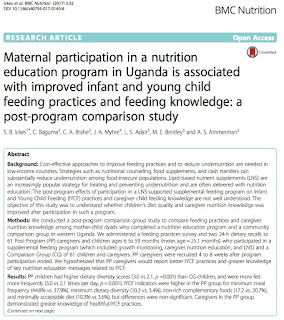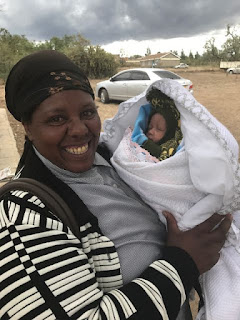A month or so ago, when Scott was in California to help his parents in crisis, and Caleb had recycled the Mountain Phase of Ranger School and was out on patrols, and I was alone here in Kenya out on a morning jog with our dog Nyota, praying, huffing, feeling the weight of broken medical systems and deferred dreams and the randomness of the harsh patrol grading and aching for him to pass . . . in my heart I thought, God, could you give me some sign it will all be OK, like, say I come around this rise and see zebras . . . Now I don't believe in the theology of the fleece. Faith should just rock on. But I confess it was how I felt that morning. Occasionally we had seen zebra in this scrubland where we run before, but I had not seen any in a long time. It's a no-man's-land between the railroad and the highway, where Maasai herd goats and sheep at times, and handfuls of poor people traverse trails to town. That morning I just wanted something like assurance. I came up the rise by the railroad that skirts a gully, and around a corner, and there they were. Zebra.
Fast forward to Sunday, when we were restlessly waiting to find out if Caleb passed the Swamp Phase and therefore would graduate Ranger School. We went for an afternoon walk, knowing it was probably too early on the East Coast to hope for a call, knowing that there were only two pay phones and the lines were probably going to be impossibly long, hoping the news would be good, but steeling ourselves for positivity should it be bad. I brought my binoculars to look at birds. Scott had to stop for a phone call with his hospital colleagues, so I sat on a rock and scanned around. No birds. So I looked in the far distance, on the other side of the highway, where some small patches of wilderness abut the sprawling slums. Dust was rising into the afternoon slant of sunshine through the clouds, probably from a dirt football field obscured by buildings. I scanned left, and there they were, between the trees: 5 zebra, again.
In the last two months, those two instances and one other morning seeing a solitary zebra near the railroad tracks, are the only times I have seen them. Each time, they gave me unreasonable hope that all shall be well.
Sunday night, Caleb called Jack. He passed. On Friday, he will graduate, as a Ranger-qualified officer, a tab that signifies 3 months of sleep deprivation, limited food, harsh conditions, slogging up rocks and through mud, in constant stress of simulated war, lugging more than half his weight in gear, being ambushed, shot at (with blanks), yelled at. At every step of the way, he could have been disqualified, often for reasons way beyond his control. The purpose of the training is to prepare these young people (historically 100% men, but now there have been a handful of women too) to lead wisely in impossible situations. We had an amazing prayer and support team getting almost weekly emails and holding him up, even as they held up the rest of our teams in East and Central Africa. Sometimes I felt a little guilty asking for prayer for one kid when the world is so full of needs. But he's our kid, and that's our heart, and I think it reflects God's heart too, wanting us to live meaningfully, all-out, standing for good in hard places, not loving life even unto death (Rev 12:11) in the battle against evil. God sees, the individual 22-year-old (for his birthday in late February he got a piece of birthday-cake-flavored GUM, that was it) pushing himself to the limits to serve others, and our entire Serge Area of people laying down their lives. And God sees the anxious mom, me, praying and hoping.
So what does faith really have to do with zebras?
Well, in medicine, we are taught that common things are common. From an America-centric standpoint, that means if something has hooves and a main and gallops past, it is a horse. Don't look for a zebra. (So if a patient has a fever and cough, think about a respiratory virus not anthrax inhalation). However, in Africa a zebra is much more likely than a horse. And this morning it occurred to me, in our lives, GRACE prevails. It may seem unlikely that a zebra would graze within a km of our house, or that our son would pass a school where 60% fail, or that we would have performed our second-ever exchange transfusion (removing and replacing double the baby's blood volume to save his brain from the toxic effects of maternal antibodies attacking his incompatible blood cells, all because even though she had lost two children already his mom couldn't afford the $65 injection to prevent this), this time with a live and improved baby at the end, or that Scott would save another mom's life with a C-section yesterday. In our world, zebras of God's grace need some celebration, because they keep showing up more often than they should.
So pause today and thank God for Amazing Grace, which always bats last as Anne Lamont says. And ask God to keep us steady when we're in the wilderness and the zebra are hard to spot. Which is most of the time, admittedly. Thanks to all who prayed. It's only one chapter in a story that will have even more hardship and danger, so good for all of us to lean into grace.
Oh, and we can now officially end Lent. Cheers.
Fast forward to Sunday, when we were restlessly waiting to find out if Caleb passed the Swamp Phase and therefore would graduate Ranger School. We went for an afternoon walk, knowing it was probably too early on the East Coast to hope for a call, knowing that there were only two pay phones and the lines were probably going to be impossibly long, hoping the news would be good, but steeling ourselves for positivity should it be bad. I brought my binoculars to look at birds. Scott had to stop for a phone call with his hospital colleagues, so I sat on a rock and scanned around. No birds. So I looked in the far distance, on the other side of the highway, where some small patches of wilderness abut the sprawling slums. Dust was rising into the afternoon slant of sunshine through the clouds, probably from a dirt football field obscured by buildings. I scanned left, and there they were, between the trees: 5 zebra, again.
In the last two months, those two instances and one other morning seeing a solitary zebra near the railroad tracks, are the only times I have seen them. Each time, they gave me unreasonable hope that all shall be well.
Sunday night, Caleb called Jack. He passed. On Friday, he will graduate, as a Ranger-qualified officer, a tab that signifies 3 months of sleep deprivation, limited food, harsh conditions, slogging up rocks and through mud, in constant stress of simulated war, lugging more than half his weight in gear, being ambushed, shot at (with blanks), yelled at. At every step of the way, he could have been disqualified, often for reasons way beyond his control. The purpose of the training is to prepare these young people (historically 100% men, but now there have been a handful of women too) to lead wisely in impossible situations. We had an amazing prayer and support team getting almost weekly emails and holding him up, even as they held up the rest of our teams in East and Central Africa. Sometimes I felt a little guilty asking for prayer for one kid when the world is so full of needs. But he's our kid, and that's our heart, and I think it reflects God's heart too, wanting us to live meaningfully, all-out, standing for good in hard places, not loving life even unto death (Rev 12:11) in the battle against evil. God sees, the individual 22-year-old (for his birthday in late February he got a piece of birthday-cake-flavored GUM, that was it) pushing himself to the limits to serve others, and our entire Serge Area of people laying down their lives. And God sees the anxious mom, me, praying and hoping.
So what does faith really have to do with zebras?
Well, in medicine, we are taught that common things are common. From an America-centric standpoint, that means if something has hooves and a main and gallops past, it is a horse. Don't look for a zebra. (So if a patient has a fever and cough, think about a respiratory virus not anthrax inhalation). However, in Africa a zebra is much more likely than a horse. And this morning it occurred to me, in our lives, GRACE prevails. It may seem unlikely that a zebra would graze within a km of our house, or that our son would pass a school where 60% fail, or that we would have performed our second-ever exchange transfusion (removing and replacing double the baby's blood volume to save his brain from the toxic effects of maternal antibodies attacking his incompatible blood cells, all because even though she had lost two children already his mom couldn't afford the $65 injection to prevent this), this time with a live and improved baby at the end, or that Scott would save another mom's life with a C-section yesterday. In our world, zebras of God's grace need some celebration, because they keep showing up more often than they should.
These 3, in one incubator, combined weigh less than the average newborn
Acute room, somehow the spindly shared oxygen and limited medicine options still save lives
Rounds, trying to find the problems in a sea of babies
The tiny baby whose mother was nearly dead from ecclampsia yesterday, and the baby that presented feet first but made it out
So pause today and thank God for Amazing Grace, which always bats last as Anne Lamont says. And ask God to keep us steady when we're in the wilderness and the zebra are hard to spot. Which is most of the time, admittedly. Thanks to all who prayed. It's only one chapter in a story that will have even more hardship and danger, so good for all of us to lean into grace.
Oh, and we can now officially end Lent. Cheers.





















































